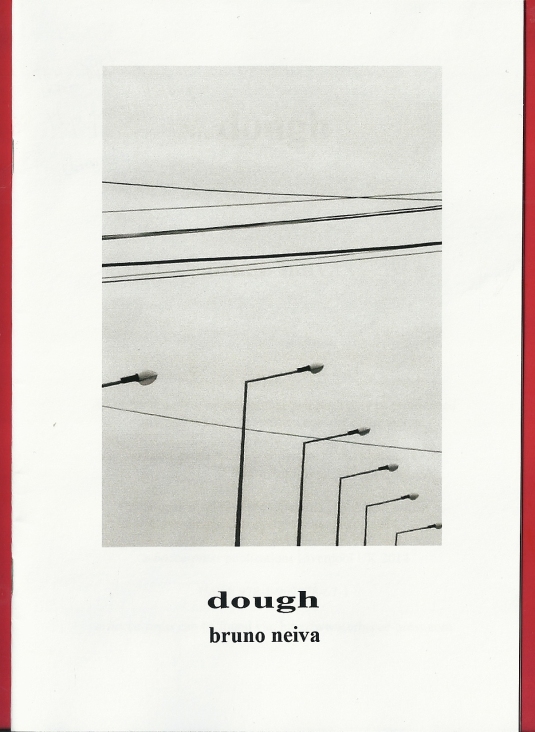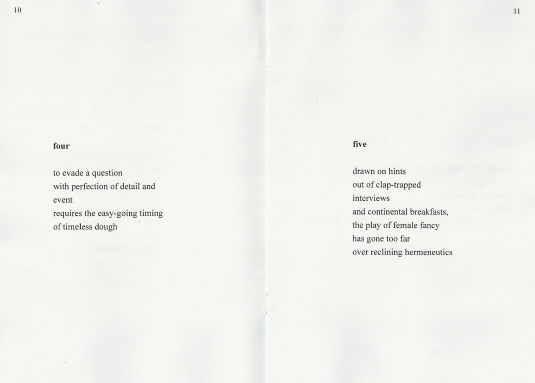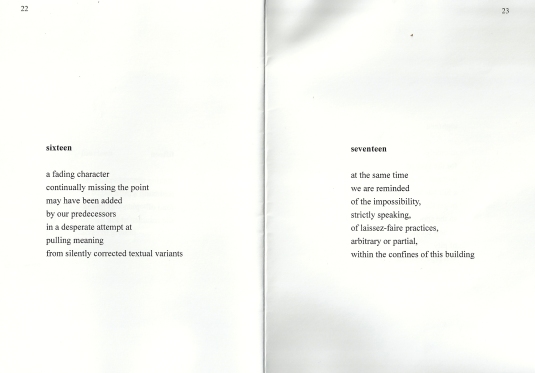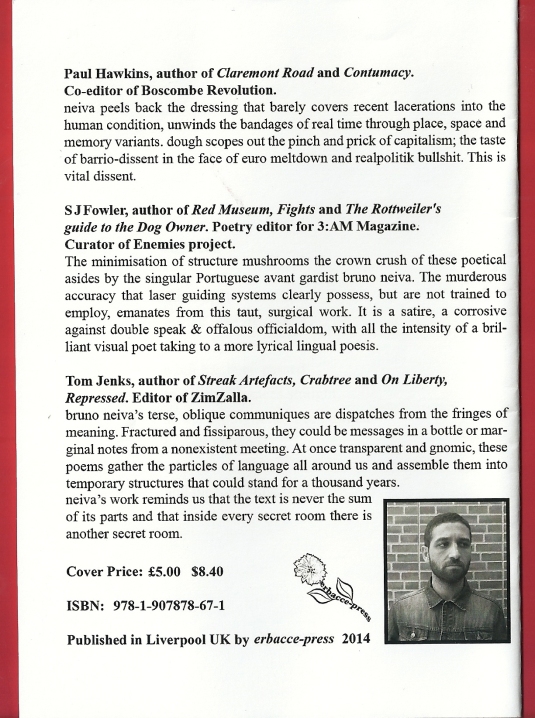Cover of dough by Bruno Neiva published by erbacce-press publications in the UK
Note: I know this is a heavy piece of writing for IUOMA-Ning. Some members will remember Bruno Neiva (now x-IUOMA) with fondness. Among other things, he was an active and welcome member of the asemic writing group. Bruno is well-known in vispo circles these days, and he does still participate in mail-art (but not extensively). I wrote this for MinXus-Lynxus.
January 23, 2015 - We consider ourselves very fortunate indeed to have first met the multi-talented textual artist and writer Bruno Neiva a few years ago through the international mail-art network. His reputation, to date, has spread far beyond the relatively underground machinations of the network. We do our best to follow Bruno’s work as it appears in various online venues.
http://barbarambarbara.blogspot.com.es/
Bruno Neiva is originally from Portugal and currently lives in Spain. Given our own interests and inclinations, we are usually most drawn to Bruno’s work that we consider visual poetry and that is rooted in collage. In our estimation, he produces very distinctive, aesthetically pleasing, and highly intellectual/conceptual work.
Bruno Neiva was very kind to send us a copy of his book dough, published in Britain last year. dough is an excellent collection of 18 well-wrought, conventional poems: conventional in the sense that we cannot apply designations such as visual, concrete, haptic, asemic, etc. to them. They are decidedly not conventional in the sense that they draw from and contribute to the literary post-avant.
Having the opportunity to dig into and explore Bruno Neiva’s poems has been a pleasure and a revelation. Returning to them again and again with fascination and with the intent to write about them, as we have been doing in recent days, we can report to you, dear Tenderfoots, that skillful minimalism provides the allure and success of dough. And we do proclaim dough a smashing success. Here are two pieces from the book we admire especially:
Given Bruno Neiva’s inclinations toward the verbal-visual elsewhere, we are surprised by the rhetorical nature (as opposed to, say, imagist approach) of these poems. (Of course we are of the opinion that those poets who surprise us are the ones with the most potential.) The poems in dough advance in surprising and unexpected ways through, a perhaps associative, counter logic.
Bruno Neiva is literally and figuratively miles and miles away from the small world of American poetry; however, we want to provide a comparison because, for one thing, it might provide a useful shorthand: We find reading the poems in dough similar to entering the near-magical rhetorical twists and turns of John Ashbery’s poems. If the reader finds a comparison to Ashbery implausible or inappropriate, then we propose more generally the late postmodern impulse has a strong presence among the enjambs and cadences of the book. The poems are highly self-reflective and comment upon themselves; they are preoccupied with language and the crucial role of language in the construction of our shared reality.
We admire dough, however, because it does not fall into the trap of dead end circular self-reflection or meta-language. This is avoided through the masterful use of minimalism. The poems are short, but – we believe – Bruno Neiva’s triumph via minimalism involves not just an economy of syllables but the creation of incompleteness in the poems. The absences are used to imply a larger world beyond the limits of the pages’ one dimensional whiteness, and the poems are engaged in a relationship – perhaps a dialog or dialectic – with this larger world, albeit focused upon language. The relative rhetorical purity (we understand the danger of such a term, but it seems accurate) of the poems contrasts with the corrupted and duplicitous constructs that define this outer world, the world we share.
We are aware that our reading of dough has grown abstract. So we will conclude attempting to end upon a note of relative clarity and solidity in terms of illuminating the preceding paragraph. We have emphasized the use of rhetoric in dough. The poems do make use of imagery as well, if sparingly. The most persistent pattern of imagery we detect relates to warfare and weaponry. As you can see in “seventeen” above, references to economics and commerce are present too. dough is deeply concerned with the current situation of the world and the role of language and signification in creating “realities” that confine and enslave. Other incomplete narratives buried in the lines suggest the importance of human relationships and stories for the reader to reconstruct. The good news is that Bruno Neiva champions the role and power of poetry to change and transform eschewing the nearly obligatory nihilism of postmodernism. The engaging quality of the poems, compelling us to return again and again, helps make us believers as well.
Comment
© 2025 Created by Ruud Janssen.
Powered by
![]()




You need to be a member of International Union of Mail-Artists to add comments!
Join International Union of Mail-Artists